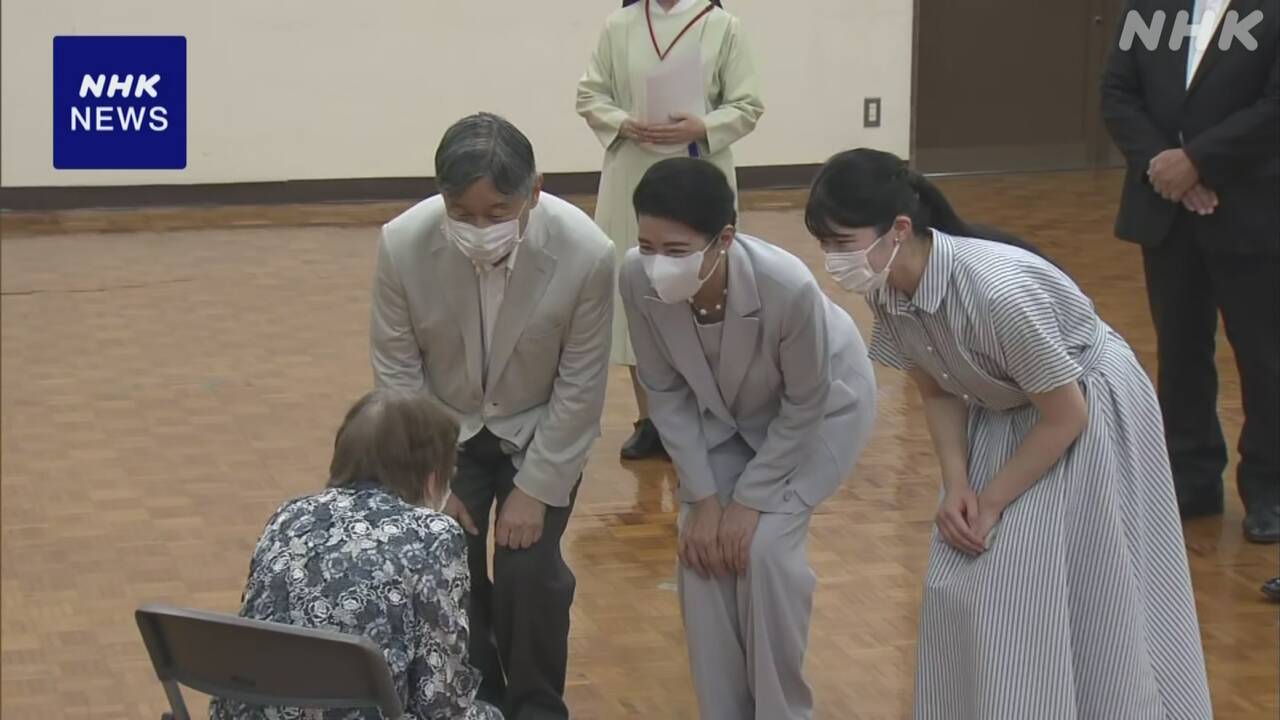Published: 2025-09-13 11:51
天皇皇后両陛下と愛子さま 養護ホームで被爆者と懇談 長崎

長崎県を訪れている天皇皇后両陛下と長女の愛子さまは、被爆したお年寄りたちが暮らす長崎市内の養護ホームを訪れ、入居者と懇談されました。
12日から長崎県を訪れている天皇ご一家は、13日午前10時半ごろに、長崎市内の「恵の丘長崎原爆ホーム」を訪問されました。
この施設には高齢の被爆者300人余りが暮らしていて、ご一家は入所者8人と懇談されました。
ご一家はひざを曲げて目の高さを合わせ、一人一人と、被爆当時の状況などについて、丁寧にことばを交わされました。
天皇陛下は「大変でいらっしゃいましたね」「いかがお過ごしですか」などといたわりのことばをかけられていました。
皇后さまは「おうちは近くでいらっしゃったのですか」などと声をかけられていました。
愛子さまは「ふだんはどのようにしてお過ごしですか」などとホームでの生活について尋ねられていました。
| # | 言葉 | 意味 |
|---|---|---|
| 3 | 訪れる | おとずれる (訪れる) : 1. to visit; to call on 2. to arrive (season, time, situation, etc.); to come; to appear |
| 3 | さま | さま (様) : 1. Mr.; Mrs.; Miss; Ms. 2. makes a word more polite (usu. in fixed expressions) |
| 3 | 一家 | いっか (一家) : 1. a family; a household; a home; one's family; whole family 2. (one's own) style; school |
| 2 | 長崎県 | ながさきけん (長崎県) : Nagasaki prefecture (Kyushu) |
| 2 | 天皇 | てんのう (天皇) : Emperor of Japan |
| 2 | 皇后 | こうごう (皇后) : (Japanese) empress; queen |
| 2 | 愛子 | いとしご (愛し子) : beloved child; dear child |
| 2 | 被爆 | ひばく (被爆) : 1. being bombed 2. being A-bombed; being nuked; being exposed to radiation (from an atomic blast) |
| 2 | 暮らす | くらす (暮らす) : 1. to live; to get along 2. to spend (time) |
| 2 | 長崎市 | ながさきし (長崎市) : Nagasaki (city) (place) |
| 2 | 内 | うち (内) : 1. inside; within 2. while (e.g. one is young); during; within (e.g. a day); in the course of |
| 2 | 懇談 | こんだん (懇談) : informal talk |
| 2 | 過ごす | すごす (過ごす) : 1. to pass (time); to spend 2. to overdo (esp. of one's alcohol consumption); to drink (alcohol) |
| 1 | 両 | りょう (両) : 1. both (hands, parents, sides, etc.) 2. counter for carriages (e.g. in a train); counter for vehicles |
| 1 | 陛下 | へいか (陛下) : Your Majesty; His Majesty; Her Majesty |
| 1 | 長女 | ちょうじょ (長女) : eldest daughter; first-born daughter |
| 1 | 養護 | ようご (養護) : nursing; (protective) care |
| 1 | 入居者 | にゅうきょしゃ (入居者) : tenant (esp. residential tenant in apartment block); occupant; inhabitant; inmate |
| 1 | 時半 | じはん (時半) : half past (the hour) |
| 1 | 丘 | おか (丘) : 1. hill; height; knoll; rising ground 2. bonus points awarded to the winner at the end of a game |
| 1 | 長崎 | ながさき (長崎) : Nagasaki (city, prefecture) |
| 1 | 原爆 | げんばく (原爆) : atomic bomb; A-bomb |
| 1 | 訪問 | ほうもん (訪問) : call; visit |
| 1 | 施設 | しせつ (施設) : 1. institution; establishment; facility 2. home (for elderly, orphans, etc.) |
| 1 | 高齢 | こうれい (高齢) : advanced age; old age |
| 1 | 被爆者 | ひばくしゃ (被爆者) : atomic bomb victim (esp. of Hiroshima and Nagasaki); hibakusha |
| 1 | 余り | あまり (余り) : 1. remainder; remnant; rest; balance; surplus; remains (of a meal); leftovers 2. (not) very; (not) much |
| 1 | 入所 | にゅうしょ (入所) : 1. admission (e.g. to a training institution, research establishment, social welfare facility, etc.); entrance 2. imprisonment; internment; confinement |
| 1 | ひざ | ひざ (膝) : 1. knee 2. lap; knee and thigh (while sitting) |
| 1 | 曲げる | まげる (曲げる) : 1. to bend; to crook; to bow; to curve; to curl 2. to lean; to tilt; to incline; to slant |
| 1 | 合わせる | あわせる (合わせる) : 1. to match (rhythm, speed, etc.) 2. to join together; to unite; to combine; to add up |
| 1 | 一人一人 | ひとりひとり (一人一人) : each (person); individually; one by one; one at a time; in turn |
| 1 | 当時 | とうじ (当時) : at that time; in those days |
| 1 | 状況 | じょうきょう (状況) : state of affairs (around you); situation; circumstances |
| 1 | 天皇陛下 | てんのうへいか (天皇陛下) : His Majesty the Emperor |
| 1 | 大変 | たいへん (大変) : 1. very; greatly; terribly; awfully 2. immense; enormous; great |
| 1 | いたわり | いたわり (労り) : 1. sympathy; consideration; carefulness; attention 2. service; labor; labour; trouble; meritorious deed |
| 1 | おうち | くぼち (窪地) : hollow; low ground; basin; pit; dip; depression |
| 1 | ふだん | ふだん (不断) : 1. constant; persistent; unremitting; ceaseless 2. indecisiveness |
| 1 | 尋ねる | たずねる (尋ねる) : 1. to ask; to enquire; to inquire 2. to search; to look for; to look into; to investigate |